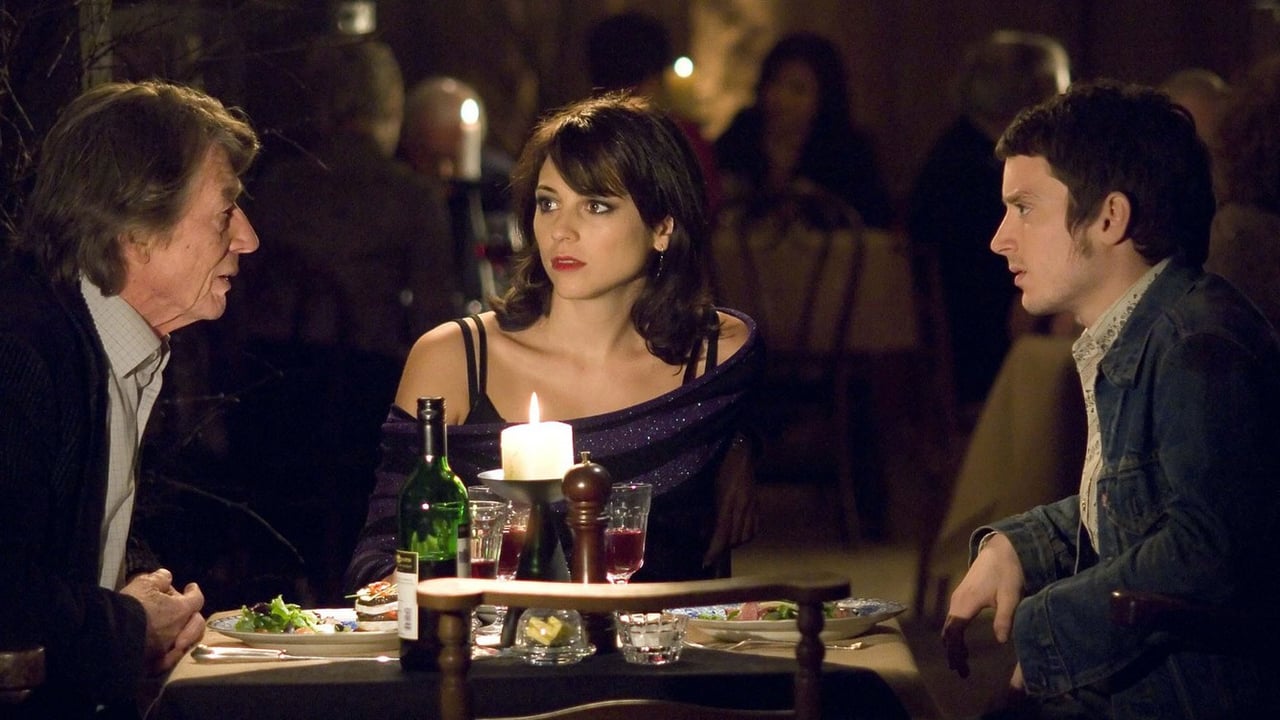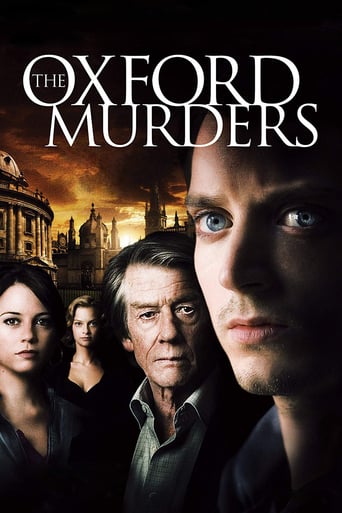Bardlerx
Strictly average movie
Afouotos
Although it has its amusing moments, in eneral the plot does not convince.
WillSushyMedia
This movie was so-so. It had it's moments, but wasn't the greatest.
Mehdi Hoffman
There's a more than satisfactory amount of boom-boom in the movie's trim running time.
matxil
Rarely a film fails on so many levels. The film tries to say "deep things" but clearly neither the writer nor the director have a clue what they are talking about, so all the "profound" stuff is merely ridiculous (low point: Wittgenstein during WWI writing in his notebook, and that's only the introduction to the film). As a Monty Python sketch that might have been funny, but since the film is pretending to say something serious, it's just embarrassing. The acting is abysmal, the plot is silly and full of holes, for some incomprehensible reason there are two girls who suddenly fall in love with the main character, but there's no way to understand why (or how, since there's zero chemistry). For me, the worst part were the dialogues, though. At the beginning, the American student who just finds a boarding room with some woman who used to know a number of famous mathematicians, picks up a photo and then explains who the people on the photo are, why they are famous, and a short Wikipedia biography of their lives. Subtle. "Well," says the woman, "you did your homework". If only the scriptwriters, the director and the actors would have done the same.
SnoopyStyle
American student Martin (Elijah Wood) arrives at the University of Oxford looking to have his idol Prof. Arthur Seldom (William Hurt) be his thesis supervisor. He rents a room from Seldom's friend Mrs. Eagleton and her daughter Beth. The women snap at each other. Martin finds a girlfriend in Lorna. Seldom loves Wittgenstein's Tractatus Logico-Philosophicus stating that there is no absolute truth. Martin tries to impress him by disputing it but Seldom ridicules him. Podorov is a bitter fellow student rejected by Seldom. Martin and Seldom discover Mrs. Eagleton's murdered body at the same time. Martin says he received a note predicting the murder but he discarded it. Seldom supposes that a murderer is daring Seldom to solve the case. Inspector Petersen is confounded by the murder and the math puzzles.I love the whodunit aspect of the story. The addition of math, logic and even a Clue-like game are all great although the math sounds a bit gobberdygoop. It also makes the dialog more clunky than regular speech. The movie goes on a little too long and it doesn't seem to advance for a stretch in the middle. The last act is also problematic. There are no thrills and the puzzle is not something the viewer can solve. I'm often a sucker for a whodunit mystery. This one starts with an interesting setup but it doesn't have much tension or payoff. Adapting this from a novel may have missed some needed cinematic elements.
teemu-uusitalo
So what we have here is an British-ish kind of detective story that has an American exchange student in it. That partially, perhaps, causes a strange blend of both American and British features in the movie.What I really love in British detective stories is that usually they are quite calm, slow and sophisticated. It creates a certain mood to the movies. However, 'The Oxford Murders' basically does its everything to destroy that mood by cinematography that just makes me want to look away. The takes are very much too rapid and hectic. I don't think it suits here at all. This American guy, played by Elijah Wood, also has some sex in the film, which I personally find too intensive for a British detective story. It just doesn't fit there. It felt awkward in this particular film. The movie was directed by a Spanish guy but I believe he knows much stuff about British detective stories if he makes one. The new stuff he tries to pull here doesn't work, though. Of course there is some good here, too. I love John Hurt's performance. Also the strange mathematics are intriguing, everything I do understand about it whatsoever. All in all, I'm not sure what kind of game the film makers are playing here. Everything happening on screen is happening too fast and oddly for this genre. I'd love to like this movie more but many details are too out of place and the whole movie is like a terribly played discord with an otherwise beautiful instrument.5/10
Guy Lanoue
I really wanted to like this film, thinking it was an old-fashioned, slow placed and thoughtful alternative to the usual special effects cesspool: using brains, mathematics and philosophy to track down a murderer. American graduate student in Oxford (Wood) has sex right off the boat with a beautiful nurse (Watling) and gets to lodge in a wonderfully eccentric and charming old house with a wonderfully eccentric and charming old woman (Anna Massey), meets eccentric and not so charming fellow student, and gets to meet eccentric and burnt out but still bitingly witty and narcissistic genius (Hurt), who is also the ex-lover of the beautiful nurse with the never-explained accent. We get it. Despite being allegedly built around a weird subset of logical-positivistic philosophy (badly and erroneously summed up by Hurt's public lecture at the beginning), in fact the movie is built around clichés. I don't understand how an allegedly mathematician turned writer could have written such a bad script. I mean, you wouldn't expect a mathematician to describe a sexy love scene, and in fact the lack of chemistry between Wood and Watling is amazing and really, really lust-killing, but to get basic knowledge of the world of mathematical logic wrong is really unsettling. Worse, math is dumbed down. The only thing this script could possibly have going for it is its use of math as a narrative device, yet we see Wood marking up a squash court to calculate better angles of attack. This is supposed to sell us on math? Why is Wittgenstein's Tractatus described as a series of mathematical equations? It's not. Why is Fermat's Last theorem anonymised by presenting it as Bormat's Last Theorem? Was the legal office on the production team somehow afraid that Fermat's descendants would put in a claim for royalties 400 years later if they actually used his name? Why is the real mathematician who finally solved the puzzle in the 1990s, Andrew Wiles, presented as looking like a summer-stock theatre director named Wilkes? Wiles' proof is over a hundred pages long, not something that can be scribbled on a board during a public lecture, though Wiles did give a talk in 1993 at Cambridge, not Oxford, announcing his proof, the same year in which the film is set. Are we supposed to get a secret thrill figuring out the roman-a-clef hints that it's really Fermat, as if that wasn't obvious to 100% of the math and science nerds and MENSA members who would watch a film like this? This is just dumb scripting: seductresses (Watling) have to be incredibly sultry, professors have to have Einstein hair and elbow patches, young and hungry students have to be iconoclasts, and so on. In the end, it's not about the bad math and bad scripting but the bad casting. Wood is not really believable as a would-be Beautiful Mind math genius, Hurt is a prissily theatrical stereotype of the Mad Professor, and Watling is way too sophisticated and sexy to be a believable nurse who melts into a mass of walking pheromones when she catches a glimpse of future Hobbit Wood. The backstories are either simple-minded (Hurt, Massey) or simply banal (Wood, Watling). In the end, the so-called math that is supposed to be the key to unlocking the murder mystery is way less engaging than the word games in The Da Vinci Code. In the end, we have a movie about math and serial killers in which there (SPOILER) no serial killers and no real math.

